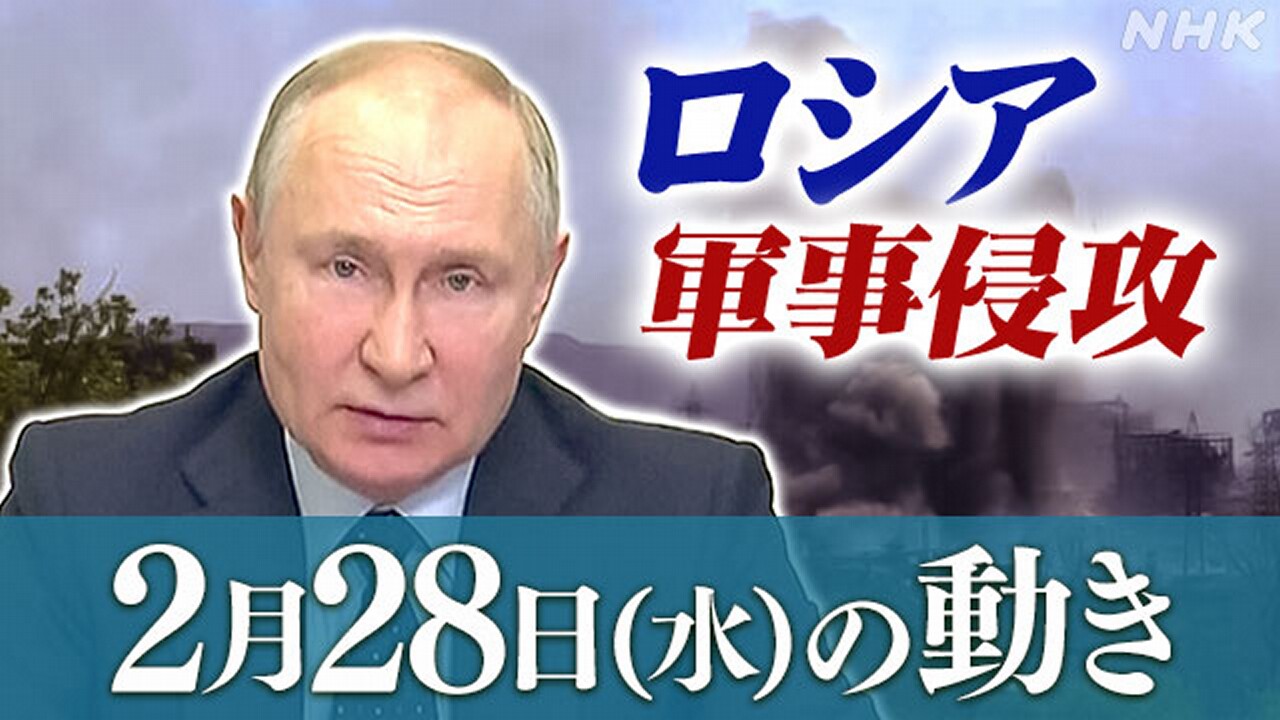Russia's military invasion of Ukraine continues.
Russian and Ukrainian forces continue to fight in various parts of Ukraine, and many civilians have fled the country.
We will keep you updated on developments regarding the situation in Ukraine on the 28th (Japan time), including the situation of the battle and the diplomacy of the countries involved.
(There is a 7 hour time difference between Japan and Ukraine, and a 6 hour time difference with Moscow, Russia)
French government is busy trying to extinguish the president's remarks
At a press conference on the 26th, French President Emmanuel Macron said there was ``no agreement'' on the possibility of Western countries sending ground forces to Ukraine, and that ``nothing should be ruled out.''
In response, leaders of European countries have been denying President Macron's statement, saying, ``We will not send soldiers.''
Of these, NATO (North Atlantic Treaty Organization) Secretary General Stoltenberg stated, ``There are no plans to send NATO combat forces to Ukraine.''
Polish Prime Minister Tusk also stated that there are no plans to send soldiers.
In addition, Chancellor Scholz of Germany, Europe's largest donor, said, ``We will not send ground troops or soldiers,'' and on the 27th, the Prime Minister's Office of Italy, which holds the presidency of the G7, said, ``We will not send any ground troops or soldiers to Ukraine.'' "This support does not involve the dispatch of ground troops."
Meanwhile, French Foreign Minister Séjournet was asked on the 27th about the true meaning of President Macron's statement, emphasizing the need for support such as demining, and saying, ``In order to carry out such activities, we must do so within Ukrainian territory in a way that does not involve fighting.'' ``We need to consider the activities of the United States,'' he said, denying the possibility of sending combat troops and was busy trying to extinguish President Macron's comments.
US spokesperson: ``We will not send troops to fight in Ukraine''
``President Biden has made it clear that the United States will not send troops to fight in Ukraine,'' Watson, a spokesperson for the National Security Council (NSC) at the White House, said in a statement on the 27th.
"The path to victory for Ukraine is for the U.S. House of Representatives to pass a budget that will give the Ukrainian military the weapons and shells it needs to defend itself and continue fighting against Russian aggression." , expressed the recognition that the House of Representatives, where the opposition party and Republican Party holds a majority, needs to move ahead with deliberations on an emergency budget bill for additional aid to Ukraine and pass it as soon as possible.
U.S. Treasury Secretary calls frozen asset utilization “necessary and urgent”
U.S. Treasury Secretary Janet Yellen visited Sao Paulo, Brazil to attend the G20 (G20) meeting of finance ministers and central bank governors and held a press conference there on the 27th.
In response to this, Secretary Yellen said that Europe, the United States, Japan, and other countries have frozen assets of approximately 42 trillion yen (approximately 285 billion dollars and Japanese yen) held by the Russian central bank as part of economic sanctions against Russia. He emphasized that it is "necessary and urgent" to provide military support to the United States and utilize it for long-term reconstruction.
Furthermore, in light of the fact that it has been pointed out that the use of frozen assets violates international law as it infringes on property rights, it is important to act with caution, but it is important not only in terms of international law but also in economic and moral terms. He expressed the idea that there is a basis for its use from this perspective.
Furthermore, with regard to military aid to Ukraine, Congressional deliberations on the budget necessary for additional U.S. aid have stalled due to opposition from opposition parties and the Republican Party. He reiterated his call for Congress to act immediately to ensure guarantees.
Nine years after the murder of Russia's opposition leader, is there a warning about anti-regime movements?
In Russia, in 2015, Mr. Nemtsov, an opposition leader who was critical of the Putin administration, was shot and killed in the capital Moscow, and the perpetrator was convicted of murder and other crimes. I don't know if it was an instruction or not.
On the 27th, nine years after the incident, European and American ambassadors and citizens stationed in Moscow visited the bridge where the incident took place, laid flowers, and mourned Nemtsov's death.
In Russia, in next month's presidential election, Nadezhdin, a former member of the House of Representatives who was close to Mr. Nemtsov, opposed the invasion of Ukraine and was attracting attention as a candidate to challenge President Putin, but the election commission did not approve his candidacy. .
Also, this month, the death of imprisoned opposition leader Navalny was announced, and support groups wanted to hold a memorial service, but on the 27th they posted on social media, ``We are looking for a venue, but Navalny's "If you give your name, you will be refused. We were also told that you are prohibited from cooperating with us."
Mr. Navalny's death has sparked mourning movements and demonstrations against the government, but Russian Presidential Spokesperson Peskov has criticized the movements of his supporters as being extremely malicious. It appears that the authorities are becoming increasingly wary of the spread of anti-government movements.

